Sochi Travel Guide
Host to the 2014 Olympic Winter Games and the 2018 FIFA World Cup, Sochi is nestled in the slopes of the Caucasus Mountains and stretches along the coast of the Black Sea. Referred to as the 'Russian Riviera', it boasts an inviting subtropical climate, pebbled beaches and botanical parks, alongside waterfalls, the UNESCO World Heritage Site of the Caucasian Biosphere Reserve and a world-class skiing resort.
Sochi is also famed for its sulphur springs and myriad health spas, including the world-renowned Matsesta district. But the city is more than just a healthy holiday destination, with the elite of Russia descending upon Sochi for the annual summer film festival while tourists flood in to enjoy the beaches. During the winter, Sochi sees a slew of travellers making their way to the nearby ski resorts, particularly Krasnaya Polyana.
Birthplace of tennis ace Maria Sharapova and Stalin's favourite holiday retreat, the city of Sochi offers visitors great skiing, hiking and sailing opportunities. Any trip here will be a memorable and relaxing one.
Things to do in Sochi
Sochi offers travellers a varied sightseeing buffet, with beaches, ski resorts and health spas set alongside scenic wilderness areas. Sightseeing in Sochi is less about iconic cultural and historical attractions and more about recreational fun, with spas, parks and sporting facilities often taking centre stage.
Popular attractions within the city include the Arboretum Botanical Garden (Dendrarium), which allows for beautiful views over the city; Riviera Park, where recreational facilities are plentiful and open-air concerts are held; the Zovokzalny War Memorial, dedicated to local soldiers killed in World War II; the Loo Temple, including ruins dating back to the 12th century; and the Discovery World Aquarium, a world-class marine facility.
Beyond city limits, the Sochi National Park beckons visitors with striking natural features like the Agura Waterfalls. The seaside resort towns of Dagomys and Gelendzhik draw sun worshippers, while ski resorts such as Krasnaya Polyana and Dombai entice snow enthusiasts.
Agura Waterfalls
Also known as Agursky, the Agura Waterfalls are one of the most famous tourist attractions in Sochi. Located just outside the city, these majestic waterfalls cascade from a height of 98 feet (30m) and are a popular stop off along hiking trails that wind through the forest along the Agura Ravine in the Sochi National Park. At the Eagle's Rocks, hikers can enjoy the view of the crystal clear waterfalls crashing down to the oval pool below and admire the panoramic views over the city and Black Sea. Swimming is allowed and a very popular activity in the warmer months. It is possible to organise tours to the waterfalls, but also easy to seek them out independently.
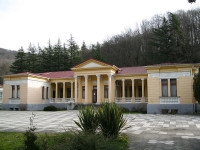
Matsesta Spa
Matsesta is a micro-district in Sochi, on the Black Sea coast, primarily renowned as a health resort. Matsesta, meaning 'fiery water', has become the city's most renowned health spa district, harnessing the powers of the hot sulphur springs that have become synonymous with Sochi. The water from the hot springs naturally contains more than 27 types of minerals and is used to treat people with respiratory and cardiac problems, though it is also perfect for simple relaxation. Featuring a number of different spa facilities which all have bathing rooms, massage tables and inhalation cubicles, Matsesta Spa is a major tourist attraction and a big draw card for travellers to the region.
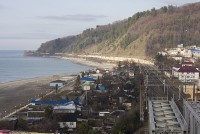
Dagomys
Located just outside of Sochi, the small village of Dagomys is a popular holiday resort on the Black Sea. The former haunt of Russian nobility in the 19th century, the holiday residence of Tsar Nicholas II still exists as a hotel. The scenic village boasts lovely pebble beaches set against the dramatic backdrop of the Caucasus Mountains and nearby mineral springs of Matsesta. Dagomys is also a paradise for outdoor activities, including hiking and bird-watching in the Dendrarium Botanical Gardens. Summers in Dagomys are noticeably cooler than in other coastal areas too, thanks to mountain air currents. While Dagomys is not as lively as nearby Sochi, the resort's quiet and relaxing atmosphere makes for a great weekend getaway.
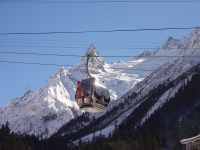
Dombai
One of the more popular ski resorts in the Caucasus, Dombai is a scenic mountain valley located at the confluence of three rivers, 37 miles (60km) from the Black Sea coast. Famous for its pure air, Dombai is frequented mostly by Russian holidaymakers, lending it a unique and lively atmosphere and preserving the town's authentic character. The facilities at Dombai are old and fairly worn, but there is a tourist complex comprising hotels and a recreation centre. Lifts and ski trackers operate on a pay-as-you-go riding system, serving varied routes catering for all levels of skiers. The gentle slopes near the top of the mountain are better suited to beginners, as the incline becomes very steep toward the bottom.
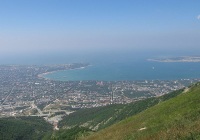
Gelendzhik
The laidback seaside resort of Gelendzhik has been around for several millennia, founded as a Greek outpost around 64 BC. The town is set along a curving bay with calm pebble beaches ideal for swimming and watersports, and land-based activities like horseback riding, quad biking and hiking. But Gelendzhik is best known for its spa and waterparks, and there is also a cable car line specially built for tourists to take in the views from atop the mountain. A new airport opened in 2010, making it easy to get to Gelendzhik from Moscow and St Petersburg.
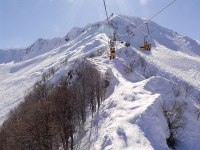
Krasnaya Polyana
Skiers and snowboarders in Krasnaya Polyana can enjoy magnificent panoramic views of the West Caucasus. Located just 25 miles (40km) from Sochi and the Black Sea coast, the resort boasts well-groomed pistes and good après-ski nightlife. It owes much of its popularity to excellent heliskiing opportunities, as well as good runs for beginners. The resort underwent massive renovations ahead of the 2014 Winter Olympics in Sochi, with facilities including the Russian National Sliding Centre, Psekhako Ridge and Roza Khutor Alpine Resort, as well as Alpika Service Mountain Resort and Russian National Ski-jumping Centre.
Getting Around
Trolleybuses and minibuses run frequently throughout the city of Sochi. Taxis are also readily available but can be quite expensive; it's best to negotiate a price with the taxi driver before setting out. Car rental is another option in the city, but the chaotic driving style, heavy traffic and lack of parking makes it inconvenient for most short-term city trips.
Sochi Climate and Weather
Sochi experiences a humid subtropical climate with warm summers and mild winters that seldom see the temperature drop below freezing. Average summer high temperatures reach up to 83ºF (28ºC), while average winter lows drop to 37ºF (3ºC). The Krasnaya Polyana mountains experience perfect snow conditions and are largely protected from the wind - unique conditions that cannot be found anywhere else in Europe. The ski season is from October through May.
Russia travel info
Electricity
Electrical current is 220 volts, 50Hz. Round two-pin plugs are standard.
Language
Russian is the official language. Some people speak English, French or German.
Money
The official currency is the Rouble (RUB), which is divided into 100 kopeks. Most major international credit cards are accepted in larger establishments. Currency can be changed at banks, bureaux de change and hotels, with ATMs widely available in major cities. It's hard to get roubles outside Russia and travellers are advised to take currency in good condition to exchange once there.
Tipping
Hotel bills in the large Russian cities usually include a 10 to 15 percent service charge. If no service charge has been added, a tip of at least 10 percent is expected. City Guides and their drivers also expect a small tip and tipping in bars and nightclubs is common.
Health
Drinking water should be treated, with bottled water readily available. Local state medical facilities in cities outside the main urban hubs are of a low standard, and visitors are strongly advised to have full insurance for medical treatment and accidents should they require private care. Blood transfusions should not be performed in Russia, due to uncertainties concerning the blood supply. Essential medications and supplies may be limited.
Safety
Though Russia is generally a safe country in which to travel, visitors should be vigilant and watch out for pickpockets, particularly on the metro and buses. Moreover, travellers must insist on seeing official identification from police officers. Political protests often end in violence and visitors are advised to avoid all street demonstrations and political gatherings.
Local customs
Photography of anything to do with the military, strategic sites or the airport is prohibited. In Russian Orthodox churches, women are advised to wear skirts and cover their heads with a scarf. It's a legal requirement for visitors to carry passports for identification, with copies not being sufficient. Russia has a poor LGBT rights record, and same-sex couples should exercise caution.
Doing business
Business in Russia is conducted in a fashion similar to Western countries, but with some subtle differences. Russians are business-minded so it's not generally necessary to form personal relations with business colleagues, but developing a good network of resident associates is a good idea.
Dress is formal and conservative and on greeting a good firm handshake and direct eye contact indicates strength. Business cards are exchanged and it's advisable to print a Cyrillic translation of your details on the alternate side. Business hours are generally from 9am to 6pm, Monday to Friday.
Duty free
The following may be imported into Russia without customs duty: 200 cigarettes, 100 cigarillos, 50 cigars or 250g of tobacco products (over 18 years), 2 litres of alcohol (over 21 years), perfume for personal use, gifts up to the value of US$10,000. Tourists must complete a customs declaration form, to be retained until departure, allowing for the import of articles intended for personal use (including currency and valuables) which must be registered on the declaration form.
Additionally, 250g of caviar per person may be exported, with a receipt proving it was purchased at a store licensed to sell it to foreigners and a licence from the Ministry of Economic Development. Any items or artwork that might have historical value, like icons, maps, coins or paintings, have to be registered with the Ministry of Culture before departure, which usually involves a 100% customs duty fee.
Communications
The international access code for Russia is +7. Hotels, cafes and restaurants offering free wifi are widely available. As international roaming costs can be high, purchasing a local prepaid SIM card can be a cheaper option.
Passport & Visa
Valid visas in expired passports or other expired travel documents are not accepted. Visitors must carry ID at all times whilst in Russia. An Immigrant Card will be issued on board the aircraft or on arrival. All visitors staying for longer than seven working days must register with the Federal Migration Service upon arrival; if staying in a hotel, the hotel will arrange this, otherwise you can find the forms to fill out at a post office and post the forms to the Federal Migration Service. Anyone travelling on a tourist visa must hold vouchers from the hotel or travel agency. Passengers are required to hold return/onward tickets and documents required for the next destination. Exit permits are required on departure. These are usually issued with the visa, or can be obtained at hotels not less than two days before departure. Passports must be valid for period of intended stay. It is highly recommended that passports have at least six months validity remaining after your intended date of departure from your travel destination. Immigration officials often apply different rules to those stated by travel agents and official sources.
Entry requirements
United States citizens must have a passport valid on arrival. A visa is required.
British citizens must have a passport valid on arrival. A visa is required.
Canadian citizens must have a passport valid on arrival. A visa is required.
Australian citizens must have a passport valid on arrival. A visa is required.
South Africans must have a passport valid on arrival. No visa is required for a maximum of 90 days.
Irish nationals require a passport valid on arrival. A visa is required.
New Zealand nationals require a passport valid on arrival. A visa is required.
Useful contacts
Russian Tourism Authority: +7 495 623 7978 or www.russia-travel.com
Emergencies: 112.Embassies / consulates in other countries
Russian Embassy, Washington DC, United States: +1 202 939 8907.
Russian Embassy, London, United Kingdom: +44 20 7229 6412.
Russian Embassy, Ottawa, Canada: +1 613 235 4341.
Russian Embassy, Canberra, Australia: +61 2 6295 9033.
Russian Embassy, Pretoria, South Africa: +27 12 362 1337.
Russian Embassy, Dublin, Ireland: +353 1 492 2048.
Russian Embassy, Wellington, New Zealand: +64 4 476 6113.
Embassies / consulates in Russia
United States Embassy, Moscow: +7 495 728 5000.
British Embassy, Moscow: +7 495 956 7200.
Canadian Embassy, Moscow: +7 495 105 6000.
Australian Embassy, Moscow: +7 495 956 6070.
South African Embassy, Moscow: +7 495 540 1177.
Irish Embassy, Moscow: +7 495 937 5911.
New Zealand Embassy, Moscow: +7 495 956 3579.



